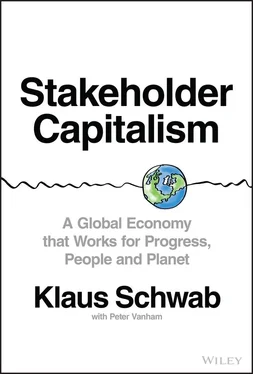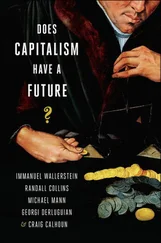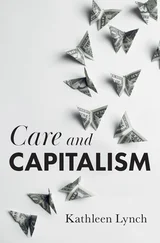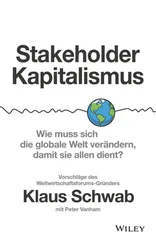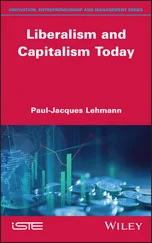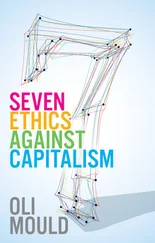Klaus Schwab - Stakeholder Capitalism
Здесь есть возможность читать онлайн «Klaus Schwab - Stakeholder Capitalism» — ознакомительный отрывок электронной книги совершенно бесплатно, а после прочтения отрывка купить полную версию. В некоторых случаях можно слушать аудио, скачать через торрент в формате fb2 и присутствует краткое содержание. ISBN: , Жанр: economics, на английском языке. Описание произведения, (предисловие) а так же отзывы посетителей доступны на портале библиотеки ЛибКат.
- Название:Stakeholder Capitalism
- Автор:
- Жанр:
- Год:неизвестен
- ISBN:9781119756149
- Рейтинг книги:4 / 5. Голосов: 1
-
Избранное:Добавить в избранное
- Отзывы:
-
Ваша оценка:
- 80
- 1
- 2
- 3
- 4
- 5
Stakeholder Capitalism: краткое содержание, описание и аннотация
Предлагаем к чтению аннотацию, описание, краткое содержание или предисловие (зависит от того, что написал сам автор книги «Stakeholder Capitalism»). Если вы не нашли необходимую информацию о книге — напишите в комментариях, мы постараемся отыскать её.
Individual agency:
A clearly defined social contract:
Planning for future generations:
Better measures of economic success: Stakeholder Capitalism: A Global Economy that Works for Progress, People and Planet
Stakeholder Capitalism
Stakeholder Capitalism — читать онлайн ознакомительный отрывок
Ниже представлен текст книги, разбитый по страницам. Система сохранения места последней прочитанной страницы, позволяет с удобством читать онлайн бесплатно книгу «Stakeholder Capitalism», без необходимости каждый раз заново искать на чём Вы остановились. Поставьте закладку, и сможете в любой момент перейти на страницу, на которой закончили чтение.
Интервал:
Закладка:
Part I PART I THE WORLD I GREW UP IN 1 75 Years of Global Growth and Development In the 75 years since the end of World War II, there has been a surge of global economic development. But despite this, the world is living a tale of two realities. On the one hand, we have rarely been as well off as we are today. We live in a time of relative peace and absolute wealth. Compared with previous generations, many of us live long and mostly healthy lives. Our children get to go to school, even often college, and computers, smartphones, and other tech devices connect us to the world. Even a generation or two ago, our parents and grandparents could only dream of the lifestyle many of us have today and the luxuries that come with abundant energy, advances in technology, and global trade. On the other hand, our world and civil society are plagued by maddening inequality and dangerous unsustainability. The COVID-19 public health crisis is just one event that demonstrates that not everyone gets the same chances in life. Those with more money, better connections, or more impressive ZIP codes were affected by COVID at far lower rates; they were more likely to be able to work from home, leave densely populated areas, and get better medical care if they did get infected. This is a continuation of a pattern that has become all too familiar in many societies. The poor are consistently affected by global crises, while the wealthy can easily weather the storm. To understand how we got here—and how we can get out of this situation—we must go back in time, to the origins of our global economic system. We must play back the picture of post-war economic development and look at its milestones. The logical starting point for this is “Year Zero” for the modern world economy: 1945. And there is perhaps no better place from where to tell this story than Germany, for which that year was truly a new beginning.
( Chapters 1 1 75 Years of Global Growth and Development In the 75 years since the end of World War II, there has been a surge of global economic development. But despite this, the world is living a tale of two realities. On the one hand, we have rarely been as well off as we are today. We live in a time of relative peace and absolute wealth. Compared with previous generations, many of us live long and mostly healthy lives. Our children get to go to school, even often college, and computers, smartphones, and other tech devices connect us to the world. Even a generation or two ago, our parents and grandparents could only dream of the lifestyle many of us have today and the luxuries that come with abundant energy, advances in technology, and global trade. On the other hand, our world and civil society are plagued by maddening inequality and dangerous unsustainability. The COVID-19 public health crisis is just one event that demonstrates that not everyone gets the same chances in life. Those with more money, better connections, or more impressive ZIP codes were affected by COVID at far lower rates; they were more likely to be able to work from home, leave densely populated areas, and get better medical care if they did get infected. This is a continuation of a pattern that has become all too familiar in many societies. The poor are consistently affected by global crises, while the wealthy can easily weather the storm. To understand how we got here—and how we can get out of this situation—we must go back in time, to the origins of our global economic system. We must play back the picture of post-war economic development and look at its milestones. The logical starting point for this is “Year Zero” for the modern world economy: 1945. And there is perhaps no better place from where to tell this story than Germany, for which that year was truly a new beginning.
through 4 Конец ознакомительного фрагмента. Текст предоставлен ООО «ЛитРес». Прочитайте эту книгу целиком, купив полную легальную версию на ЛитРес. Безопасно оплатить книгу можно банковской картой Visa, MasterCard, Maestro, со счета мобильного телефона, с платежного терминала, в салоне МТС или Связной, через PayPal, WebMoney, Яндекс.Деньги, QIWI Кошелек, бонусными картами или другим удобным Вам способом.
) provides an overview of global economic history since 1945, both in the West and Asia. It explores the major achievements and shortcomings of the economic system we live in, including increased economic growth, and also inequality, environmental degradation, and debts for future generations. It also looks at how societal trends, such as increased political polarization, are related to the state of the economy and our governance systems. Part II Конец ознакомительного фрагмента. Текст предоставлен ООО «ЛитРес». Прочитайте эту книгу целиком, купив полную легальную версию на ЛитРес. Безопасно оплатить книгу можно банковской картой Visa, MasterCard, Maestro, со счета мобильного телефона, с платежного терминала, в салоне МТС или Связной, через PayPal, WebMoney, Яндекс.Деньги, QIWI Кошелек, бонусными картами или другим удобным Вам способом.
( Chapters 5 Конец ознакомительного фрагмента. Текст предоставлен ООО «ЛитРес». Прочитайте эту книгу целиком, купив полную легальную версию на ЛитРес. Безопасно оплатить книгу можно банковской картой Visa, MasterCard, Maestro, со счета мобильного телефона, с платежного терминала, в салоне МТС или Связной, через PayPal, WebMoney, Яндекс.Деньги, QIWI Кошелек, бонусными картами или другим удобным Вам способом.
through 7 Конец ознакомительного фрагмента. Текст предоставлен ООО «ЛитРес». Прочитайте эту книгу целиком, купив полную легальную версию на ЛитРес. Безопасно оплатить книгу можно банковской картой Visa, MasterCard, Maestro, со счета мобильного телефона, с платежного терминала, в салоне МТС или Связной, через PayPal, WebMoney, Яндекс.Деньги, QIWI Кошелек, бонусными картами или другим удобным Вам способом.
) digs deeper in the possible causes and consequences of our economies’ problems and progress. It looks at the role played by technological innovation, globalization, and trade, and the use of natural resources. Finally, Part III Конец ознакомительного фрагмента. Текст предоставлен ООО «ЛитРес». Прочитайте эту книгу целиком, купив полную легальную версию на ЛитРес. Безопасно оплатить книгу можно банковской картой Visa, MasterCard, Maestro, со счета мобильного телефона, с платежного терминала, в салоне МТС или Связной, через PayPal, WebMoney, Яндекс.Деньги, QIWI Кошелек, бонусными картами или другим удобным Вам способом.
( Chapter 8 Конец ознакомительного фрагмента. Текст предоставлен ООО «ЛитРес». Прочитайте эту книгу целиком, купив полную легальную версию на ЛитРес. Безопасно оплатить книгу можно банковской картой Visa, MasterCard, Maestro, со счета мобильного телефона, с платежного терминала, в салоне МТС или Связной, через PayPal, WebMoney, Яндекс.Деньги, QIWI Кошелек, бонусными картами или другим удобным Вам способом.
through 11) looks at possible changes to our global economic system. It provides a definition of stakeholder capitalism , and shows what it can mean in practice for businesses, governments, international organizations, and civil society.
Интервал:
Закладка:
Похожие книги на «Stakeholder Capitalism»
Представляем Вашему вниманию похожие книги на «Stakeholder Capitalism» списком для выбора. Мы отобрали схожую по названию и смыслу литературу в надежде предоставить читателям больше вариантов отыскать новые, интересные, ещё непрочитанные произведения.
Обсуждение, отзывы о книге «Stakeholder Capitalism» и просто собственные мнения читателей. Оставьте ваши комментарии, напишите, что Вы думаете о произведении, его смысле или главных героях. Укажите что конкретно понравилось, а что нет, и почему Вы так считаете.
